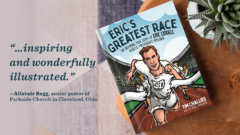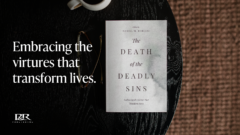We awoke this morning to hear about the terror plot that was foiled in England. While we are grateful that no harm was caused and no damage was done, we quickly realized that it may make getting home more of a chore. We’re expecting long lines through security. And I guess my hair gel and toothpaste will have to be left behind. How sad. This morning’s conference kicked off with a wonderful time of worship led by Pat Sczebel. Bob Kauflin then recommended several books to us: God’s Big Picture by Vaughan Roberts, According to Plan by Graeme Goldsworthy, and Bible Doctrine by Wayne Grudem.
This morning’s session, “Christ Our Access,” will be led by Mark Mullery, Senior Pastor of the Sovereign Grace Church in Fairfax, Virginia. We first heard from Ryan Ferguson who happens to have memorized the book of Hebrews. He recited for us from memory chapters nine and ten. It was just a thrill to listen to Scripture brought to us in this way. I’ll try to find out if Sovereign Grace intends to release a video of this presentation. I hope they do, for I’d suggest that any Christian would be just as thrilled as I was to watch this. It was incredibly powerful and makes me desire to have such knowledge of Scripture. I can see how helpful it would be to churches to have Scripture presented in this way.
Last night we learned that God’s eternal purpose is to dwell among a people He has made His own and we saw this through five pictures. In the first session Jeff answered the “where” question – where has God chosen to dwell among His people? Today Mark will work from Hebrews 10:19-22 which will work not only with the “where” but also with the “when.” When do we get to go to heaven? This passage informs us that since we have Christ we can go to heaven today and we don’t have to die to get there. He will work with the text that says “Since we have confidence to enter holy places and since we have a great priest over the house of God, let us draw near.”
Since we have confidence to enter (verses 19-20) – Confidence to enter what? Christ entered into the Holy Place to accomplish his high priestly work and He remains there to this day. We are told through Scripture that believers now have confidence to enter the holy places. The basis for this confidence to enter heaven, God’s presence, is the blood of Jesus. The job of a priest was to offer sacrifices to atone for sins and make worshippers acceptable to God. There were many priests and many sacrifices. But these sacrifices, as we know from Hebrews 10, didn’t really do the trick so they had to be offered continually. The continual offerings were a reminder that sin had not been dealt with in a decisive way. But then a new priest came–a different kind of priest. He was from the tribe of Judah, not Levi. Jesus Christ came and, like other priests, offered a blood sacrifice. But this was a different kind of blood and was not the blood of bulls and goats. Instead, He offered human blood. It was a human sacrifice. He was to give His life in exchange for the lives of sinners. His death opened a way of access or entry into God’s holy places. It provided a way that had never been opened before–a new and living way. It’s new because it did not exist and it is living as long as Christ lives and intercedes for us. D.A. Carson says, “Objectively, what brings us into the presence of God is the death and resurrection of the Lord Jesus.” It is not a person, a song, an instrument or the passion of the singer that brings people into the presence of God. It is not the task of the worship leader to bring people into the presence of Christ. Objectively, it is the death and resurrection of Christ that bring us into God’s presence. If we do not get this right, we rob Jesus Christ of glory.
Since we have a great priest (verse 21) – Who needs a high priest? We do not spend a lot of time thinking about priests, but this question is worth pondering for God informs us that we have a priest, and in fact, a great priest. In the sacrificial system God instituted to deal with human sin, He is seeking to act graciously. He could institute execution, and would be just in doing so, but then He would have no people with whom to dwell. So instead he instituted the priesthood so there would be mediators between God and His people. From this group of intermediaries, there was on great priest, the High Priest, who entered once a year into the Holy of Holies, the Holy Place, to offer the key sacrifice. He got there by going through a curtain and went into a place where God’s presence was manifest in a unique way. There he made an offering on his behalf and on behalf of the people. So who needs a priest? Sinners need a priest. Hebrews tells us how Christ is a greater priest, a better priest, than any who preceded Him. Christ is a great priest because when He finished offering His sacrifice, unlike all other priests, He sat down. His work was done, it was accomplished, once for all. Christ brings us into the very presence of God Himself. No priest in Israel ever went into this Holy Place. They went into a Holy Place made with human hands, but Christ lives forever in the holy place of heaven.
We can enter God’s presence because God revealed Himself in the form of a person. God who dwells with His people makes it possible for us to dwell with Him because one day He chose not to dwell with His Son. At the cross, the Son of God was abandoned by the Father and this is the reason that we can come into the presence of God today. Every thought and experience of dwelling in God should remind us of this.
Let us draw near (verse 22) – Having seen the two “sinces” of this passage, we turn now to the application. Verse 22 is pivotal in this book. From this point it turns primarily towards exhortation and response. Verse twenty two demands this response: let us draw near. This is priestly, temple language. What does it mean to draw near? We must first think of a priest and how he draws near. This refers to coming into the temple with a sacrifice to worship and deal with the problem of sin. The temple system was a system of worship that first provided a solution for the sin problem. Priests did not work by themselves in the temple but were part of a covenant community and a chosen people. When we think about drawing near we realize that we no longer need human intermediaries as in the Old Testament. We draw near to God as a nation of priests and a royal priesthood. We draw near as an expression of worship, as a covenant community, and for a solution to the sin problem. We are to draw near and are to draw near now. This passage informs us that God has given us access to Him right now, today. By faith we can draw near. We are invited and welcomed into God’s presence. Heaven is not simply an offer for later, but is a place God intends that we visit today and repeatedly for the rest of our lives.
Here is how this may look in real life: In private – We draw near to God in many ways such as reading Scripture, singing and prayer. In the church – There are corporate expressions and experiences of drawing near to God such as when we gather for preaching, singing and praying. When we gather on the Lord’s Day, God is present to bless in unique ways. Subjectivity is a particular temptation for musicians and worship leader. So how does one examine worship objectively? Asking “did we get into God’s presence” will not be useful. We need to ground our evaluations in the objectives of Scripture. “Did we draw near in faith to Christ? Did we draw near through songs that speak of the work and person of Christ?” The goal is not to obtain a subjective experience but is “by faith to draw near.” We draw near and enter through the blood of Jesus. Pastors and worship leaders must teach their worship teams and congregations to evaluate worship objectively. In all of life – We can draw near to God in all of life. In Hebrews 11 people are commended for drawing near to God not in their prayer or song, but in the way they lived. They brought all of their lives to Him so He informed and directed all of their lives.
When do we get to experience God’s presence in heaven? When do we get to go to heaven? It is now. We have full access even now through the death and resurrection of our Great Priest.









